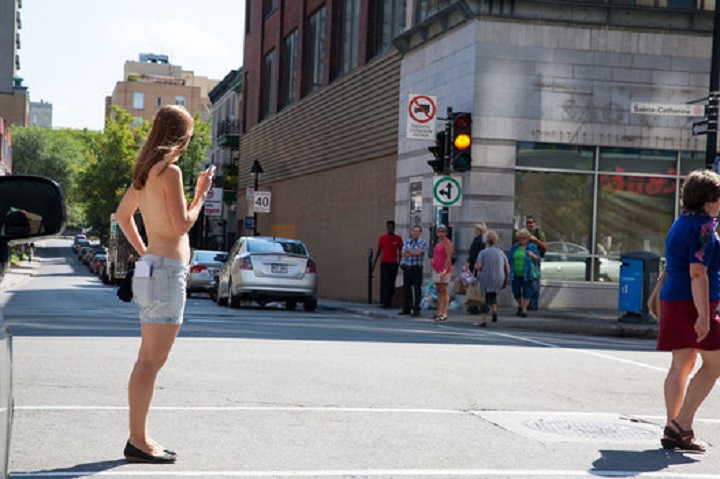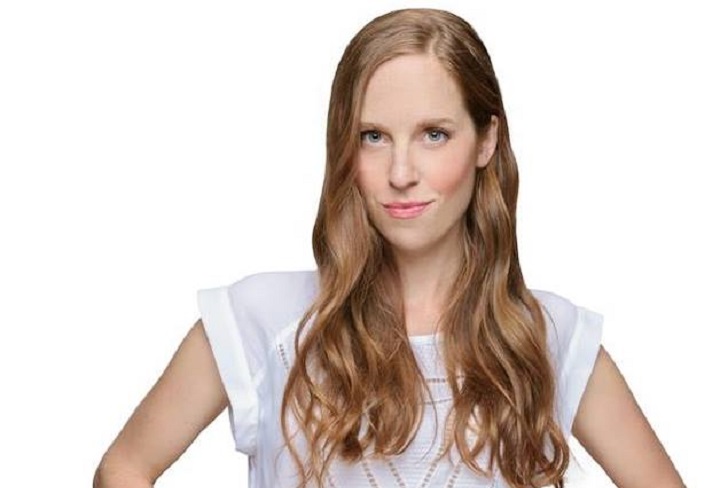MONTREAL – When female students at Helena High School in Montana protested a rule that required them to wear bras on campus, journalist Lili Boisvert, known for her outspoken columns on sexuality, said she was proud that the teens felt comfortable standing up for their rights.

“Breasts exist…to feed babies. We don’t have breasts to excite men,” said Boisvert.
“That was never the purpose of them. We made it this way. It’s a cultural thing.”
The incident at Helena High started after senior Kaitlyn Juvik was called in for a dress code violation last week when another student reportedly complained they were uncomfortable because she wasn’t wearing a bra.
Female students supported Juvik by showing up to school without their bras.
READ MORE: Fredericton High students protest school’s dress code
Boisvert argued there’s a huge double standard when it comes to men and women’s bodies.
“I remember being a little girl and integrating that idea that my breasts were obscene and I remember becoming aware, self-aware, of the way my breasts looked,” said the 31-year-old.
“As I was growing up, I felt like I had to hide my nipples all the time and make sure they weren’t showing off.”
In 2014, Boisvert conducted an experiment in sexual double standards in downtown Montreal.
READ MORE: Ontario sisters stage topless protest after being told by cop to cover up
Standing on Sainte-Catherine Street, she took off her shirt and walked around the Gay Village and the Quartier Latin.
“I was prepared to get arrested, I thought that was a possibility,” she said.
“The guy who was taking the pictures was also topless. I asked him to be topless so if it happens that an officer arrests me, I could point out that it was a double standard.”
The reactions from people passing by, she said, surprised her.
“I think a lot of people tried to ignore me on purpose, maybe they were uncomfortable, maybe they thought I was crazy,” Boisvert said, adding that she was cat-called by one man.
“It made me happy because it confirmed that breasts don’t necessarily generate a sexual response all the time.”
READ MORE: Moncton teen disciplined for wearing full-length halter dress to school
Reaction on social media, though, was very different.
“People were calling me a slut, saying that what I did was not appropriate,” she said.
“A lot of people were telling me that I should have done it in a more religious neighbourhood or somewhere where people are closed-minded.”
WATCH BELOW: Dress code rebellion
Boisvert said she can see the social rebellion of women who refuse to allow society to dictate what they should or should not wear is quickly spreading across the world.
READ MORE: Toronto student organizes ‘crop top day’ to protest school dress code
“We still don’t see the sexism in that double standard. I have trouble getting over that and I think I won’t until it changes.”

Boisvert points out women have already come a long way in changing the way society views their bodies.
“Legs used to be obscene and now we can show our legs and men can appreciate women’s legs and find them attractive, but it’s still not a reason for women to hide them,” she said.
“It doesn’t have this impact over our lives.”
Boisvert said she believes the de-sexualization of women’s bodies will come with each passing generation.
“When I see that teenagers understand, I think we’re going in the right direction,” she told Global News.
“I think younger people understand that. They’re more aware.”
rachel.lau@globalnews.ca
Follow @rachel_lau










Comments